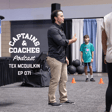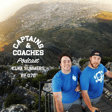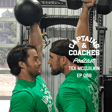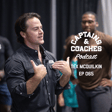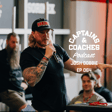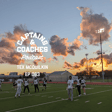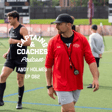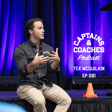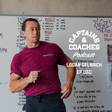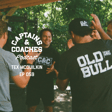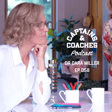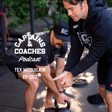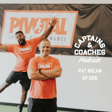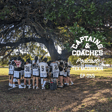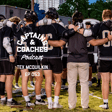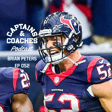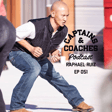Introduction and Margo's Philosophy
00:00:00
Speaker
the biggest thing was just believing in myself and knowing that I had the capability and the possibility to do it. um Even if I was unsure, like I was undoubtedly, I would visualize myself on top of the podium. And even in 2013, when like, if you looked at paper, meek versus the other athletes, there was no way like Margo would make it.
00:00:16
Speaker
But like, I believed in it. I visualized it. I executed. if any bumps came up, I stuck to the plan and I qualified. Obviously again, it comes down to the work and putting the effort in. But I think for myself is believing the fact that I can do it and having like,
00:00:28
Speaker
like almost like a all or nothing mentality. And i think that's really important. is like, if you doubt yourself and you don't think you're able to do it, what you tell yourself and how you talk to yourself will have a direct impact to your body. Welcome to the Captains & Coaches Podcast. We explore the art and the science of leadership through the lens of athletics and beyond.
00:00:44
Speaker
I'm your host, Tex McColkin, and today we're joined by Margo Alvarez, a seven-time CrossFit Games competitor who dominated the sports during its golden era, 2013 to 2019. But Margo's story goes far beyond athletic achievement. From her diverse background and athletic roots in Montana to the Games podium,
00:01:02
Speaker
She discovered that true transformation happens when we train not just our bodies, but also our minds. Now through her Go Train program, Margo empowers athletes and everyday movers to build strength that extends far beyond the gym walls.
00:01:17
Speaker
This isn't just about sets and reps. It's about cultivating resilience, embracing challenge, and using movement as the vehicle for personal growth. Margo believes fitness should prepare us for life's adventures, whether that's conquering a mountain or simply moving through our daily lives with confidence and vitality.
Margo's Sports Background and CrossFit Journey
00:01:36
Speaker
Get ready for an inspiring conversation about visualization, overcoming adversity, and the profound connection between physical and mental strength.
00:01:45
Speaker
This is your invitation to redefine what's possible. And now, we'll hand it off to Margo 3, 2, 1, and action margie oh well magic's in the editing margo thank you very much i was margo alvarez i was like trying to combine them like bennifer ben affleck uh jennifer lopez real quick um so well sorry about that rough start welcome to the show fine thank you for having me i'm excited to be here
00:02:16
Speaker
Yeah, that ah we have a lot of mutual acquaintances and friends in the fitness industry. So this is ah an exciting opportunity for me really to relive some of the glory days that were fitness in that 2010 to 2020 timeframe. It was a special, special place for for CrossFit. And ah yeah, you you are one of those name brands that really built that fitness brand, especially on the the games.
00:02:45
Speaker
So again, thank you for the opportunity to connect. Of course, I'm excited to be here. I think, I think back to those early days and those were some of the definitely some great memories back then. I think some people kind of joke about it, like the golden era of CrossFit or golden era of the games.
00:03:00
Speaker
And I think a lot of people are probably on the same page with this, but definitely, I mean, that was a big chunk, all my chunk of competing. And I think there was a lot of good memories, a lot of good kind of moments back then. um But it's always good to reflect and reminisce. And I think that sometimes is,
00:03:13
Speaker
just a constant reminder to really be present where you are and, you know, appreciate each moment you have because time will go by fast and then you'll look back and be like, oh, remember when? i been so I'm definitely grateful for those times.
Community and CrossFit Passion
00:03:24
Speaker
And the the healthy competition because when it's three, two, one, go, you're you're pushing, you're moving, you're shaking, but at the end of it, there's still all love for everybody. that's That was the beauty of of the games at that highest level.
00:03:40
Speaker
Mm-hmm. You were doing it because you loved it. And I remember Jenny Labah, you remember her back in the early days, like 2011, 12, 13, but I went and trained with her before my first year at the CrossFit Games in 2013. And she was telling me, know, do it because you love it. If you start to do it for other reasons, you're going to start to lose that lose that love and passion. And that was something that always stuck with me.
00:03:59
Speaker
And it's like, I'm doing it because I want to push myself to the highest level to see what can I accomplish? Like how far can I push myself? I'm doing it for the love of the sport, not for anything else. So it was a it a good reminder. but can Yeah. And ah just working with high level female athletes within the CrossFit realm, what I found is they always had a base, just a foundation of athletic things growing up and this life that they led that then maybe went and athletic career was over.
00:04:29
Speaker
For example, Chrissy Adkins, college lacrosse player, shout out. Then there was this platform that was still high intensity, it was competitive and an opportunity to be on a team because that's what a lot of the the community aspect was for it.
00:04:44
Speaker
So it take us all the way back to growing up Montana and just this collection of fitness that you you built right from the get go. Another pun, sorry.
00:04:55
Speaker
Yeah, ah it it plays into it. um Yeah, so I pretty much grew in Montana. I was actually born in La Jolla, California. Only spent about five years my life there. Once my youngest sister was born, moved to Seattle, outside Seattle, lived there for a couple of years.
00:05:09
Speaker
But I pretty much consider myself a Montana montana girl. Spent most of my life there. um Had the opportunity to do like some ballet, little bit of gymnastics for a short amount of time. um did some Taekwondo, horseback riding.
Holistic Fitness Approach
00:05:21
Speaker
And I think the collective mix of sports that I got into and variety of activities got into definitely helped shape who I am, but also allowed me to kind of explore different avenues.
00:05:30
Speaker
And I was just talking to some clients at the gym today about that in regards to, you know, kids shouldnt shouldn't just do one sport, especially when they're growing up. Like, yes, if you want to be really good at one thing, you eventually can get there. But it's a it to have a variety of sports or activities under your belt, I think it gives you a little bit diversity.
00:05:47
Speaker
I think being able to play golf, play volleyball, do Taekwondo, I think a lot of those things help set the precedent for not only being dynamic, but being being able to dabble and level up in different activities.
00:05:58
Speaker
Do I want to do them all? For sure. Is it impossible? Not necessarily, but it's hard to obviously excel in one if you're doing three or four. But I think as a young child, having that opportunity to do that and shout out to my mom for like taking us to ballet and gymnastics and jazz and horseback riding, taekwondo and golf, all these things back and forth. I think that was very important.
00:06:16
Speaker
And so I'd say to anyone out there that are considering putting their kids in activities or sports, I do it. like I'm so glad I had that base because that allowed me to, one, I think stay grounded. Two, it gave me a good foundation. I think the golf and the Taekwondo specifically helped me with my mindset and staying calm.
00:06:32
Speaker
And you know you can you know crap the bed on one hole, but if you get inside your head, you have another 17 holes or another round after that, that you still have to stay sane. So I think the collective mix of sports and activities I had growing up was very beneficial. And I'm super glad super glad I had that experience.
00:06:49
Speaker
Mm-hmm. Yeah, within the the realm now, ah still coaching lacrosse, had the opportunity to play college ball, but seeing kids, they want to specialize and move away from sports.
00:07:01
Speaker
But then ah ah a sport like lacrosse, it is just such an amalgamation of all different sports, basketball, soccer, football, contact, baseball, hand-eye.
00:07:12
Speaker
So all these tools that almost make you a great player can be built by – not specializing, but just dabbling in all those sports ah growing up.
CrossFit Competition Experiences
00:07:23
Speaker
And in same respect to CrossFit, it's all these different now energy systems and demands of all these different sports were called upon and you had exposure to it versus just getting stumped at the games when the the old, what was it called? A chopper?
00:07:41
Speaker
ah Chipper? I would say wood chipper, the chipper, yeah. Yeah. Whenever that that was in play. So Yeah, it's so cool that that base was established. And then what i also appreciate is you you had a love for fitness and competition that you held on to.
00:07:59
Speaker
Yeah. Thank you for that. i am i think it's important. i like Community has always driven like pulled me in. But I think it's important like as you grow and as you evolve, whether it's competition or you're just moving for life to be able to live a longer, healthier life, I think it's very important. like Once you stop taking your body through ranges of motion, once you kind of start sitting on the couch more, your body is going to start to take the positions of what you spend most your time.
00:08:22
Speaker
And I get if we have jobs or we have a position where we have to be in front of the desk or computer, ah get that. But it's like do something each day to kind of combat that, whether it's walking or hiking or going to the gym you playing pickleball, which I know has become really popular recently.
00:08:36
Speaker
um But I think the biggest thing is like fitness and activity. It's not just like, okay, we're we're working out, but it's, you're finding some sort of activity that you fall in love with that allows you to stay active. And I think that's a big component to that, you know, fountain of youth people talk about, obviously there's other factors that play in part, um but you think of it like a wheel, like a spoke, right? Like all these different spokes that come off of it. You have fitness, you have your sleep, you have your, your stress, right? Your time management, your pleasure, your, all these other things that play into it. And I think you, you know, negate most of them, next thing you know, you're going to of feel off or funky, like a blown tire.
00:09:10
Speaker
And yeah, only strengthening one of those pillars, the whole thing then falls apart. Maybe it's functioning strong for one moment, but when one of those spokes breaks, it's, it's too hard, especially the older you get to get back on the road.
00:09:27
Speaker
Yes. Everyone has a First CrossFit workout story. So I'd love to hear yours of how it went. Did you love it? Did you hate it? Did you get hooked off the bat?
00:09:39
Speaker
What was in what was a workout? Yeah. So they're kind of like two experiences of that. I'll give my initial first one. So the first one I'd been a, I was a a personal trainer at a gym. I'd left them some marketing and a couple different, gym um, um,
00:09:53
Speaker
different jobs in Oakland and i changed gyms. I had like a ah free month or a free like a session with one of the trainers there. And so his a his name is actually Dusty, so Dusty Solon, which owned CrossFit Santa Ramon back in the day, which I think he's still there.
00:10:08
Speaker
um But he's, he was like my first exposure to it. But um he's like, Hey, we're gonna do this workout. i was like, cool. And I ended up finding out later is filthy 50. And it was like, I know.
00:10:19
Speaker
Like I look back and I'm like, oh, that's my first workout. But that's so like grassroots cross. We're like, we're going to give you the worst, hardest workout. Like, good luck. But I remember I did some interval training, circuit training. I was an NASM certified personal trainer. So like I had an idea of some of that stuff, but lifting a 45 pound barbell overhead for like the push presses, I just remember dying and the burpees and the wall balls, everything, double unders. It was so hard, but that was my first exposure. And I was like, man, this is really hard and really difficult, but i I think I kind of liked that pain. I liked that challenge. I think I've always been drawn to
00:10:53
Speaker
challenges. I've always been drawn to, I would say maybe uncomfortable situations. Cause I know that's where growth happens or maybe on so like unconsciously, I didn't know that that's where growth happens. And so I really liked that. so was my first exposure.
00:11:05
Speaker
He was like, yeah, I should check out CrossFit. And I was like, okay. And I ended up never not doing it. um ended ended up just doing like little workouts that he gave me. And then I would just go to the gym and get getting into like Tough Mudders and obstacle courses, joined a UFC gym.
00:11:17
Speaker
I wanted to get into submission wrestling. Fast forward a little bit more. I ended up joining, going to a gym with a friend of mine. He's like, Hey, we're to go do this workout. It's down the road. was like, cool. And it was ah burpees and snatches. I don't remember specifically, but I just remember it being so hard. And all I had were the 45 pound bars and I have one short thumb. So my right thumb is short on my left.
00:11:36
Speaker
So trying to hook grip that barbell, I was like, this bar is going fly out of my hand. going hit some of the bar. So it was crazy. But I remember afterwards just being on the floor. like, wow, that so hard, but so refreshing. Yeah. It was it was a while. So those are like kind of like two experiences with my first workout.
00:11:52
Speaker
Yeah, that that sounds about right. People either love it or hate it or tried it, hated it. And they're like, actually, this sounds like a good time. ah yeah And then within the respect to the the competition side of things, because there's there's getting fit, there's community aspect.
00:12:10
Speaker
But then there's the games. This is a whole different other. This is a whole different level. So yeah did those those community workouts lead to an open? Like how did you get involved in the competitive side of things? Yeah. So I joined, I think like a couple weeks before the open started. I think this was like end of...
00:12:27
Speaker
early 2011, like and end of January, beginning of February, I think when, I think the open started maybe in February, March. Um, but I want to see like two to three weeks and people like you should sign up for this. i was like, okay, why not?
Competitive Strategy and Mindset
00:12:37
Speaker
I'd done a couple of half marathons before and I wasn't shy of like signing up for stuff.
00:12:41
Speaker
So I signed up and I am definitely a little competitive, excuse me. So i was like, well, i want to do good. I remember emailing my family after like the first week of like, I'm doing this competition and I'm like thirtieth place.
00:12:53
Speaker
Because I was just so excited. So I did that was the first year 2011. The first year was kind of a bi week because that issues so many people had signed up. It was the first year doing the online kind of qualifier. And so they ended up in two weeks for that first open. off If you remember that it was a double unders and snatches.
00:13:07
Speaker
um And so did the open that first year, didn't make it far, volunteered for. the NorCal regionals that year. ah Sorry, sorry, but volunteered for the SoCal regionals that year. Absolutely loved it. I was like, i go to compete with these ladies. I remember seeing Becca Voigt, Chris Clever, and ah Katie Hogan on the competition floor with the thrusters, if you remember that. That was down in SoCal, SoCal and Del Mar.
00:13:29
Speaker
And I saw that I was like, these women are badass. I want to be like these women. And so I had volunteered for the games that year and I saw those women competing. I was like, I want to make it here. Like, this is incredible. And that was kind of like my fast track, I would say, to competition in terms of seeing that, visualizing it, being a part of it in the sense of volunteering.
00:13:47
Speaker
was like, um want to do this. So then after that, I had like the job I had for a marketing company. They were moving. And so I ended up kind of just doing contract work with them. Picked up two coaching positions, two different gyms in the Bay area.
00:14:01
Speaker
And i was like, i'm going to do whatever I need to do to, to get there. Yeah. That's awesome. Yeah. My, I'm a, I would say i was that CrossFit, CrossFit Cooley drinking girl for sure. wait that Back then, back then it was interesting.
00:14:14
Speaker
It was different. It's it's before like the CrossFit became an identity. It was still this, this opportunity abounds. um Yeah. That, Back in that time, I was managing CrossFit gym in DC. That's where I met Christy.
00:14:30
Speaker
And then nice I was leading it like a sports team, the the community that we were building. And the Open was, it it was our Super Bowl. None of us were going to make it ah that far, but it was an opportunity for us to truly come together and then like see what the morning and the evening people coming together was like. So.
00:14:50
Speaker
Yeah, it was a it was a special time and really leaning into those online events to build your own gym community. i feel they did a great job back in that day.
00:15:01
Speaker
And then, yeah, yeah. And then the StubHub Center, I felt that was I've been to Madison as well in 2017. So the StubHub, I feel like that was that was just perfect for vendors, yeah for fans, for competitors.
00:15:17
Speaker
Just a great layout. It was. I agree. I think um the open stadium obviously like played a part into it. And I remember in 2013, one of the events, it was 2007 where we started off a 1K row. And then we had like 25 pull-ups, seven shoulder overhead for like four or five rounds. I think it was five rounds.
00:15:37
Speaker
um And I just remember like doing this workout and like the sun was setting. it gives me goosebumps talking about it, but like the sun was setting. You could see like the beautiful sky, like the crowd erupting in these auroras as people cross the finish line. And it's like, it was very special. was very unique. And I think obviously the history of, you know, from 2010, it being the first year and then being able to have it transform of the years, it was just unique. And I think in 2015, you know, having that sandbag event where you had to go back and again, it gives me goosebumps, but like you replay relive what people did back then, the athletes did back then. I'm like,
00:16:09
Speaker
it just it gave this aura about it that nothing to take away from madison because i had the opportunity to compete at both locations but it's just it's different right i think part of the history there makes it unique the vendor village made it open where people could pass through you had the different stadiums um and i think again part of that like you said that i mean i know i mentioned it earlier but like that grassroots beginning like here we're all here to throw down and just you know get nitty-gritty and get after it and the a joke i had with a ah teammate did c Sidebar, did you ever attend CrossFit football seminar turnn back in the day? I didn't, but i knew i knew of Joel and worldborn Wellborn. and I knew a handful people that knew him pretty well, um but I didn't get to That was something like all my agenda, but I never got to it.
00:16:53
Speaker
Yeah. so i I was on that team. so A buddy mine, Luke, we we'd always joke that, yeah, we went to the games. We were just running a booth and attending all the events.
00:17:04
Speaker
So but that's still a great experience. Yeah. Oh yeah. It was fantastic. And we had a ah vertical jump set up at our CrossFit football booth. So we're just testing people's vertical jumps, trying to connect, um, performance into, into the world. And it was, it was all around, um A great time.
00:17:25
Speaker
Time out. Let's take a second to talk about the Old Bull Training Program. This is an online strength and conditioning program that I'm writing for myself and handing to you. I'm a former collegiate athlete, strength and conditioning guinea pig for the last 15 years. I'm feeling every game, I'm feeling every training session and exploratory work.
00:17:44
Speaker
that I've been through. Now I take all those lessons and the feeling and the pressure and the corrections and then I hand it off to you. What I love most about the program and highly encourage people to do is film their lifts, post it into the feed, and then we give them fast feedback to help them correct those lifts. Why I love that, everyone else gets to see those lifts, they see the coaching cues, and they're starting to learn and develop their own coordination and maybe seeing something that someone else is doing that they can feel for.
00:18:15
Speaker
That's the beauty of this program.
Mental Preparation and Visualization
00:18:17
Speaker
It's constantly evolving and we're we're having fun there. That's the also also the thing. We're having fun. There's great leaderboard and people are finding others to compete with.
00:18:27
Speaker
I love the program. I'm out there doing it with you. and i encourage you to train with me, not for me. For a free trial, seven days, click the link in the show notes. Try the old bull program. And now back to the show. Ready, ready and break.
00:18:41
Speaker
I'd love to know like some behind the scenes, like what was your mental approach? Because mean, was multiple workouts a day in traditional sports. We're like, here's our game. I got one time to mentally prepare, but what's unique about CrossFit. I got two, three, four workouts in a day.
00:18:59
Speaker
So take us into your mind. Like, what do you what were you leaning into? What was your your approach to each workout? And did it change on the different days when stuff really started to get tough?
00:19:12
Speaker
For sure. that's a great question. I think to lay the ground groundwork, my coach was very valued mindset and valued kind of like how you talk to yourself. I think it was very important. And I agree. i think growing up and having golf as one of my sports that I played, it would played into that mindset of being able to kind of stay even keeled.
00:19:28
Speaker
Even though it may be chaos on the outside, if you're hitting crappy balls, you're going to the water or the sand, you still have to kind of stay balanced in your head because you still have so many more shots. You still have so many more holes, especially if you're playing three or four days.
00:19:39
Speaker
So I think that kind of helped. um One thing that I really relied a lot on and my coach was adamant about was visualization. So visualizing the workouts, visualizing the events, if we knew them like regionals or open where you kind of plan for it.
00:19:50
Speaker
So i would anticipate, you know, focus on each movement, moving from one time to the next. Minimizing transition was very important. As it played into regionals, depending on which region you had, you had maybe a week to maybe two weeks, maybe three weeks back in like 2014 to kind of plan and prepare for that. So visualization was a huge component.
00:20:06
Speaker
physically, like going through the motions, practicing, but also mentally. And I think that helped me get reps in a way where I'm getting those repetitions. So by the time I get to the competition field, I'd already done it multiple of times. um Learning to let go, um learning to you know maybe appreciate what it went well, what didn't go well, how could I improve on that? And then letting it go and not hold on to it. Because see a lot of people, whether it was back then or recently, you hold on to these negative experiences or bad finishes. And then you hold onto that and then that carries on to the next and the next and the next event. And then you're in this deficit because you didn't let go that first workout. So I think I really try to practice that not only in my day-to-day training, but also mimicking competition.
00:20:47
Speaker
the The games obviously were a little different where maybe you don't know what elements are going to be next. You don't know exactly what the details are going to be until right before or maybe the night before. So being able to think on the fly and be dynamic, think through all the possibilities was important. But a lot of the visualization I think was that groundwork for myself and going through those repetitions were important and repeating it over and over and over, even if it seems redundant.
00:21:08
Speaker
It's like, that's where those, you know, small transitions of the two to three seconds add up when like, you're wasting too much time getting to chalk or go Oh, I left my belt over there. Oh, I need to grab my wrist grabs. Oh, I forgot to you know, move the bell to the next station or that's because that's, you know, that's going to allow me to move on to the next round. So small things like that, i think added up and that allowed me to be a little more proficient, proficient.
00:21:28
Speaker
Did you ever watch film or was your coach ever able to, to give you feedback quickly after each workout? Yeah, depending on the situation, like if I had the opportunity to go back in the back, whether regionals, the games, i had the opportunity to go over and like, let's talk about dissect it. Hey, went well, went and go well.
00:21:45
Speaker
How could we improve? um For sure in games, I would go back and watch old element or old events or I'd watch film with myself transitioning. I think that's really important. I know obviously in football that people, a lot of players will go back and watch film.
00:21:58
Speaker
I think that also played a part. I'm not sure. I imagine it's still part of people's routines, athletes routines these days, but I think with events, you have so much history now. It's like going back and looking at old events. Obviously there's, you know, you're looking 2010 to 2022. That's a different, obviously different timeframe for sure.
00:22:12
Speaker
But I think it was important to go back and look at old workouts and say, all right, if you know my competitor is really good at gymnastics, where am I going to make the edge on her? If she's going crush the handstand pushups, do I change my strategy or do i make sure I take advantage of what I'm strong at? I remember in 2011 when I volunteered, i can't remember the athlete's name, but she crushed the 1K run into the 30 handstand pushups. She like crushed the 1K run. She came in super fast, but handstand pushups were not her jam. Another athlete came, I think five or six spots back and she just dominated the gymnastics and i was able to get on the rower.
00:22:42
Speaker
So I think it's, you know, understanding and knowing your athletes that you're competing with at the same time, you can't control that. So focus on your controllables, but also be aware of, Hey, if I need to be aware of my athletes or my surroundings, how can I play into that based on the research that you did?
00:22:57
Speaker
So I did do some of that. i think that was important. And also looking at, even if it was, if film wasn't and around, I could go back and look at times, like what were the times for this athlete in this regional this year? Yeah. Yeah. That's cool. You were scouting your opponents. I didn't realize that was, that was a part of it.
00:23:12
Speaker
ah thought it was just, you do you. And yeah, I think, well, I think it's a blend of both, right? Like I think my coach was doing a lot more like looking at, Hey, this athlete did this and this spend a lot more time on that. I think that's important.
00:23:24
Speaker
Again, I think you as an athlete, you can not control them, right? You can control yourself, but you also can be aware like, all right, if I know they're going break there on the pull-ups, but I know I'm strong enough to get through them.
00:23:35
Speaker
Maybe I, play into the strengths that i have so that I can pass them and get it advanced. Like for example, the the marathon row in 2018,
00:23:45
Speaker
I took the same approach, similar approach to 2013 when we had that 2K row into the half marathon, because it was essentially a time trial, right? Like your one score was 2K, your second score was a half marathon. So if i take the same approach-ish, right? If I get ahead in the beginning, maybe that's going put me out in front and I can keep that lead for the full marathon.
00:24:05
Speaker
Is it a gamble? Yes. Could I lose it? Yes. How am I going feel the next day? Don't know. But at the same time, like I'm going to take that gamble And obviously it played off like winning the marathon row was great. um My partner, my training partner, Whitney Glenn, she got second. So we had the same strategy kind of time trial that 2k ish. Right. And then settle into a pace you can try to maintain the hold.
00:24:23
Speaker
So it worked out. My goodness. not how Yeah. Just it sounds like so much work. I'm sweating thinking about it. ah yeah What was your favorite, uh,
00:24:37
Speaker
like workout during that games, any games, what was your favorite event? i was trying to think of the word event. Yeah. um I would say, mean, out of all the years, I think the 2013, 2007 in 2013 event was great because like I said, that one K row into the 25 pull-ups seven push jerk, I think it was for five rounds just because the setting was incredible. And what gives me goosebumps is like, it was not the entire movement. One, like I was able to finally s sink my butterfly pull-ups together and to have it come to culmination with,
00:25:05
Speaker
on the biggest stage was incredible, but also crime crossing the finish line and having people erupt in like these loud cheers, and like throw high fives. You don't even know these people are strangers, but we're all community. And like, we wouldn't, we as athletes wouldn't be there without them, right? We wouldn't be there without the community and the communities they're supporting us. So it was like, there's like synergy of like excitement and celebration. And that was one of my favorite workouts. Cause like I said, the sun was setting, it was this culmination of the day.
00:25:29
Speaker
Didn't win it. can't remember how I placed on that, but it was such a epitome of a memory. being in that subhub center. And then after that, I think the 2015 games, the pegboard event, because that was my first win, being able to complete the pegboards, get to the roar, get to the salt bike. And it's funny because I leading up to the games, there was a pegboard at the gym that I was going to in El Paso. And I told my coach, I was like, Hey, like I should maybe get on that. Maybe they'll have it. Like, no, we have other things we need to work on, like strict handstand pushups, which he was right. st Strict handstand pushups for sure needed more work.
00:26:00
Speaker
But when it came up at the games, I just like laughed at myself. cause i was like, Oh man. But I think it was a blessing in disguise because not knowing how to maybe necessarily use it or utilize it played into part to actually being able to not go in there with expectations.
00:26:13
Speaker
Granted, I had done a lot of ice cream makers and training on the rings. So I think that position mimicked what you had on the pegboard, but being be able to go out there, have an event win. And I didn't know till afterwards, but Amanda Goodman, she had gone all the way through the pegboards as well. She got onto the bike. i don't know how many calories she got on, but she had gotten second.
00:26:31
Speaker
But like, I think a a lot of people were like, why she going ham on the bike? She has another workout. I'm like, in my mind, there were previous heats. I don't know how far they got. Like, I
CrossFit Games Highlights
00:26:39
Speaker
didn't know. And I didn't want to watch the screen because I didn't want to, like my coach, I think was watching the screen to see how people were doing it. But I was just focusing on like how I would mimic that movement.
00:26:47
Speaker
um But I think for myself, it was like, I don't know how anyone else is going to do or had done in the previous heat. So my goal is just go all out, leave everything out there. And, you know, and again, it worked out. I took the gamble and it paid off.
00:27:00
Speaker
There you go. The yeah, peg boards. So I mentioned offline. Yeah, I worked with Christie coming back from a bicep tear from ah Team Invictus, like she returned home to DC.
00:27:13
Speaker
And then we were doing so much true eccentrics, like she was trying to hold a good push up, pull up position. And then I would muscle her down. Like we're trying to gain confidence in, uh, in that bicep again. So truly overloading it to the max amount.
00:27:30
Speaker
And we did so much just trust within, uh, the different positions. And then when pegboard came up, Luke and I were sitting like front row for that event. And then she, she finished fifth, I believe it was the 2016 version of that.
00:27:43
Speaker
But just like people got smoked on that. And I'm like, wow, We freaking hammered this over and over again. As soon as that, uh, like was listed, I was so happy. I'm like, Oh, we got this game game over.
00:27:58
Speaker
Heck yeah. Um, So that's awesome. Yeah. I'm getting goosebumps from that moment in the, in that, uh, the bowl stadium from, from that, uh, what I've always wondered and and you brought up a point I want to highlight is the, like, it's, it's supposed to be random.
00:28:13
Speaker
If you were the first heat, it was always random. What was it like being in the shoot? Did you get to see the others compete or they keep you in like a silent quiet room? So you didn't know what's like the background.
00:28:25
Speaker
Yeah. Yeah, I'm trying to remember. i think some things they caught like they kept us in like a room where we couldn't necessarily... i think one of the years... I'm trying to remember this. One of the years we we all had to sit in this undergrad. This was in in the StubHub Center. We were like in like concrete basement somewhere. We didn't know what with the workout was. They were announcing it, so we couldn't hear what they was going on. So they kept us in there. I can't remember what year. Had it been like 15 or 16, maybe.
00:28:49
Speaker
um But we essentially didn't really know what was going up. And I think it was actually like the was the Fibonacci triangle or something. than It was like 10, 5, 10, 15 or 15, 10, 5 or something like that. I can't remember, but it was like bar muscle ups and a thruster or something like that.
00:29:04
Speaker
But they essentially kept us in there. Other times where like you could see the heats going out, you could see people doing the workouts, the lifts, the vents. um I think with the pegboard, I can't remember if the athletes were there to lock. I think that maybe the coaches could be in there, but like the athletes couldn't be in there. I can't really remember, but I don't remember really watching that. Cause I remember I was practicing on the rings in the back, just like trying to get prepared. And I, I mean, that was like the second to last workout, right? There was two workouts last year smoked. You're kind of like, Hey man, given it all I got.
00:29:31
Speaker
But um I think for the most part, I think it's a great point. Like you first heat does like, Hey, they're kind of like, you're the trial you know, he say how it goes. And then after that, you can kind of play into it depending on but how much, you know, or how much you hear.
00:29:44
Speaker
um And again, also there's, that can be good and bad. Cause there were some times where, you know, the workouts were played out and it's like there, I remember in 2016, there like box jumps and D ball overs. And there was a lot of issues with like reps being miscalled or like judges being called and like myself and other people had gotten some no reps when in actuality, like they were good reps. They were like, extra like we did extra reps. And so it was this, again, that's obviously part of the, like that's part of the process, right? no one's gonna have a perfect um run we'll say, but yeah, that was something and you can use. That's, that's uncontrollable, right? You can't control that, but how you respond to that is, is important.
00:30:18
Speaker
Yeah. Yeah. Working with a lot of high schoolers, just the refs make a call. And then you're almost training their response but versus what the actual call was. And then as a coach, if I spend more time calming the kids down, then I can't talk to the refs about it. And so if they're trained to be calm and let the refs say what they're going to say then I can go can communicate to the refs to try to manage and and mitigate or argue appropriately. Right. Yeah. um
00:30:49
Speaker
but Exactly. Yeah. So the the what seven consecutive games, is this a record? Do you hold the record? I don't think I hold the record. i think there's some other athletes that have a little bit more. I want to say...
00:31:04
Speaker
Probably there's like eight. want to say eight. I mean, I know Becca's gone, gone like 10 times. I know some of it's been like individual to like masters. So, I mean, mine was six individual, one team, but I know, I think in the beginning, like, I think Lauren Fisher has six, again, the handful, I think Annie Thorisotter, she has maybe like eight or nine. I could be wrong. Don't quote me on those.
00:31:23
Speaker
But I think ah and i'm I'm very grateful for that because every year you never are guaranteed next year. Right. You're never going to guarantee gar be guaranteed. hey you're going to go back. Is there injuries or limitation? there other athletes that have never made it that are going to come up?
00:31:37
Speaker
um And so I tried tried to make sure that I made the most of every year that I had every opportunity. And it's tough because as an athlete and as a competitor, you want to be one. You want to be number one. You want to win. And it's like winning is fucking hard. Excuse the language. It's hard, right? Like to consistently win is difficult. And like to consistently make it back, like I was always grateful and thankful to make it there. But it's like next year, like, what am I going to do? Like, what do I got to work on next? right Because the level of competition is always going to elevate us.
00:32:01
Speaker
And like Dave always elevated us as athletes. And I know there's different people who say different things, but I'm grateful for Dave Castro because he constantly pushed us as athletes to like rise the occasion.
00:32:12
Speaker
You either rise to that level of training, you rise to the level of competition or you don't. And if you're not prepared, cool. Go back to the drawing drawing board, board, excuse me. And the perfect example is 2013 when I had the legless workout, these thrusters and legless.
00:32:23
Speaker
And I remember it was like four, three, two, one of legless and like thrusters. And that was a lot of athletes failed that. it was difficult. But it's like buck up. you know, we've got to rise to the occasion because next year come regionals, there was 10 legless rope climbs with a run in between, right? So it's like you either train and you practice and you push or you don't. And again, perfect example, 2015, pegboard comes out, comes back again in 16, right?
00:32:47
Speaker
So I think um think there's a lot of things that can challenge us. And so for myself, it was like to go back and continue going to say i'mnna compete again and again and again, and to make it seven years in a row, six as individual, im obviously one as a team, like that's hard and it's difficult.
00:33:00
Speaker
um I have a hard time giving myself props, let alone like recognizing that. But I think it's something that's really important to say you have done X and you continue to do X and you continue to show up and push. And like, that's something you have to be like and accomplishing or at least celebrate the success. Like I tell them athletes and clients, like celebrate that success, embrace their struggle and continue to make the most of every single day. So I would continue to make the most of every year year and every competition because I knew next year is not guaranteed.
00:33:26
Speaker
you know, things change. Life happens. Yeah. And more people enter into the competitive pool that are, amazing athletes.
Balancing CrossFit and Business
00:33:35
Speaker
the yeah What was it like transitioning from individual to team?
00:33:42
Speaker
Oh, that's a good question. So I think in 2018, after the games, I was like, man, like i'd already launched my wine brand. I'd already had like my fitness kind of media company I was running doing.
00:33:54
Speaker
And I think it was, it was tough mentally more than physically, right? Like, like you said, other athletes are coming in younger athletes that have been doing it since they were teenagers coming in. So the level of competition, the age was decreasing, right?
00:34:05
Speaker
Um, And I think it got to the point where i was like, man, like I really liked this, but it's hard to do both. It's hard to like focus on my businesses and focus on competition. Cause I might physically be in the gym, but then I'm mentally mad. I need to be doing promotions. I need to ride along to the distributors. I need to reach out to these wine shops.
00:34:19
Speaker
And it was just like this back and forth. So I think after that year, i was like you know like I'm, I'm thinking of stepping away and a lot of people are like, no, don't go. And it's hard. cause it's like, I love competing and I love challenging myself at the same time. It was like, I think I'm transitioning to competing with the wine business or competing with my fitness but business and like being able to focus more on that.
00:34:38
Speaker
And then an opportunity arose a, what was it in, for the rogue invitational, I think was May. That was my last individual competition. i was like, Hey, this is my last individual competition.
00:34:49
Speaker
I'm you know stepping away from this. going focus more of my businesses. Um, I think that was like the open 2019 was like, I'm not going to do the open because going focus on my businesses. I'll focus on coaching. And then rogue invitation was my last individual, which I love. I've been part of rogue since 2015. Very grateful for them. I love Katie and bill.
00:35:05
Speaker
I love the community and the standard that they hold. And to be a part of the Rogue Invitational since 2019 has been an absolute honor. And I wanted to have that as be like, hey, this is my last individual competition. An opportunity arose right after that to be with MbexXX with Christy Aramo, Holden and Sam. And that was a really cool opportunity. Like I've known them for a long time, all them for a long time. And to be able to be a part of that was good.
00:35:26
Speaker
Um, I hadn't done, I'd done some team series with like Dan and Sam back in 2015 and rich 2015, 2016. So I had some, some good experience with that. Um, it's definitely a little more, I would say of a mindset sometimes because you don't want to let your teammates out and you're like, man, I don't want to shed the bed, not just for myself, but for them, you know?
00:35:45
Speaker
So I think that's something you understand is you may not be, the strongest at some points, you may not be the weakest, like you might be having a strength, right. But then another teammate will have their weaker moment and then vice versa. So it's like, you know, kind of like an accordion, right. You're meeting yourself where all the other athletes are.
00:36:02
Speaker
You're finding that common ground and you step up where you need to. So it was a really cool experience. I loved it. I had a blast and I'm glad I had the opportunity with them because I know after that, I mean, 2019 was with a lot of things were changing with CrossFit.
00:36:13
Speaker
And obviously, you know, 2020 was a crap show with everything that happened. So I'm glad I took the opportunity to do that. And obviously they were really welcoming and, you know, bringing me in was awesome. Yeah.
00:36:23
Speaker
And so fun question in line with that. What were your post individual competition meals? Because you're burning a hell of a lot more calories.
00:36:34
Speaker
And then what was like the the team meal? Where the team decide to go after that one year? Oh, man, that's a great question. I can't even remember. Oh, we afterwards we went to Chick-fil-A and I've never been to Chick-fil-A.
00:36:48
Speaker
I know. I'm not like I think so. Like a little backstory I had growing up, we would eat a lot of like fried chicken like in Montana. There was a store down the road called Gary and Leo's. My mom would get like fried chicken. We'd eat fried chicken. I think I ate lots of that.
00:37:03
Speaker
So I had like my fellow chicken, but then also going into college, I was afraid of gaining like the freshman 15. I also, I think I went through a little bit of an eating disorder, had anorexia for a little bit that kind of fell into or transcended transitioned into like bulimia, not a good habit, binge eating, all that stuff. So I think I was like,
00:37:19
Speaker
In my mind, I'm like, I need to eat healthy and like fried chicken's bad. So ever since then, I'm like, man, I really don't eat fried food. um so I was like, cool, go get a grilled chicken. They're like grilled chicken. I'm like, I don't know. It's like, I mean, I think I had a bite of someone's, but it like, it was fun just to celebrate together. I think we've got like milkshakes too or something like that, which i love milkshakes. I had a milkshake for sure.
00:37:38
Speaker
um but yeah like post competition it's usually and it's tough because i think i have a really good relationship with food now like i worked through that through after university and got to the point where was normal and i think it's funny because like oh if gonna have a hamburger like cheeseburger i don't consider that a cheat meal or people like oh yeah cheeseburger hamburger is like bad i'm like oh like i just i know it for me doesn't seem bad but i would always have some sort of like Dessert. I love dessert. So and I love wine. So I would definitely have a couple glasses of wine.
00:38:06
Speaker
I would definitely have some dessert, maybe two desserts and just like enjoy myself. Right. think we we train a lot and a a lot of us eat for performance. Right. So you need the calories. You need the macronutrients for that.
00:38:17
Speaker
Um, at the end of the time, like, again, I have my wine brand that I manage and run. So it's like, my motto is work hard, wind down. So like, I'm going to have a glass or two at the end of the day, not only just enjoy myself, but I know like tomorrow's not guaranteed next week's not guaranteed. So I know that I'm going enjoy myself, especially through a competition. Like you might be a little more strict on how you're eating and what you're doing, at the end the competition, it's like, all right, you know, celebrate the success, enjoy yourself.
00:38:39
Speaker
Oh yeah. I mean, that's, that's what I would be thinking about the whole time. I'm just, give me that bottle of wine. Just kidding. Yeah. Bottles, line them up. Bottles, exactly. Yeah. Well, it's funny because I think – oh, go ahead.
00:38:53
Speaker
No, just all the all the chicken, all the Chick-fil-A, waffle fries. Let's go. Yeah, I love waffle fries. Those are bomb. It makes me think of like churros. I love churros as well, like the cinnamon sugar. That'd be for sure I'd have after that.
00:39:06
Speaker
um But one thing I was just going say is after the marathon row, that was a – Wednesday? we had Wednesday. I remember going back to the hotel restaurant in Madison and ah whatever I ate, I can't remember, steak or something like that, mashed potatoes. And then um I had a glass of wine and I think Pat Belner's parents were there and they're like, oh my God, Parker's having wine after the marathon? She's amazing. I'm like, I mean, hey man, we have tomorrow off. We're like, all right, I'm going to enjoy my glass of wine. It'll be fine. like We just rode however many you know calories. I was like, I'm pretty sure a glass of wine is not going to hurt me.
Training with Injuries
00:39:36
Speaker
Yeah, and alcohols. love Pat Belner and his family.
00:39:39
Speaker
Yeah, alcohol is seven calories a gram, right? So you can yep drink more and get more energy. I get it. okay All these years of games, I imagine there were never not injuries as a part of this training.
00:39:55
Speaker
So speak to us about the seasons, the seasonality of setting up your training. And did an injury ever derail a plan where you had to almost overwork to get back on track?
00:40:07
Speaker
No, that's a great question. ah Luckily, I didn't have a lot of injuries. want to say like knock on wood, even though it's already passed. I think being smart, taking some time after the games to kind of de like decompress also, not just physically, but mentally, right? there's a lot of stress, training, all that.
00:40:19
Speaker
So taking a couple weeks after the games, just you know hopping with classes, kind of do whatever I want. I'm then slowly ramping up. think the biggest thing that my coach was really implementing was making sure that I'm still... focusing on strength, but also conditioning, right? Like not just doing one or the other, but kind of constantly blending both, especially these days where it's like, you need to constantly elevate and push yourself, like working on your conditioning, whether that's specifically in one modality or multiple domalities, uh, uh, modality, excuse me, also working on high volume gymnastics.
00:40:47
Speaker
A lot of this training that he had me do was, you know, maybe kind of, you look at like time-based or structured, like if you're looking at runs, right, you'll have like a runs for time or you have an interval, or you have multiple 400s in a workout, but taking that same kind of timeframe and taking it, hey, maybe what about muscle ups? What are your max set of muscle ups? How many muscle ups can you do in broken?
00:41:05
Speaker
Can you do them in you know sets of 10 or sets of eight for five or six sets? Also, can you do them after a mile run? like And um obviously that played into 2014, right? Where it's like, you know you have to do muscle ups in broken. Every time you break, you have to do 200 meter run.
00:41:18
Speaker
So a lot of the training we did, you look at like kind of time domains within a specific implement or movement, right? Taking that through gymnastics and weightlifting all that stuff. And we'd also, he'd also do a lot of kind of repeat stuff from the past, whether it regionals or games, kind of taking those elements and pulling them back, which is good. Cause then you can kind of retest say, Hey, how am I doing improving from last year's regionals to last year's games, et cetera.
00:41:40
Speaker
In terms of injuries, the role I had had some like, the only I would say the one really big injury I had was a broken first rib on my left side in 2014. 2014 was when they had strict handstand pushups come out in the open for the first time, or sorry, in the regionals.
00:41:55
Speaker
And it was like twenty one 18, 15, 12, nine, six, three, or something like that of like strict handstand pushups, front squats, and burpees over the bar. And that's like my like kryptonite, strict handstand pushups at a deficit or even worse.
00:42:08
Speaker
So we had done a lot of high volume negatives, strict handstand pushups leading into regionals, did regionals. And then I think maybe a couple weeks after, um I felt like a pinch in my neck and I thought it a pinched nerve over my neck.
00:42:21
Speaker
I came to find out my first rib was broken, which when I went to the chiropractor and he did an x-ray, he's like, your back looks fine. Your neck's fine. But like you have a first rib. He's like, how'd you do this? Like a broken first rib. was like, i don't know. I was the only time I've seen this is from pictures, like high repetition throwing.
00:42:36
Speaker
was like, hey, i was like, maybe the handstand pushups. So I think that could have been it. Like the whole, the high volume maybe created like stress fracture. Maybe i was I was doing jerks that week. So maybe I brought down the bar to my shoulders and like something tweaked, pinched or something like that.
00:42:50
Speaker
i don't know exactly what specifically caused it, but that was my major injury. And that was leading up to the the games in 2014. And it was difficult because it was the question my coach and I went through was like, well, do I continue to compete or do I like pull out?
00:43:01
Speaker
I was like, I'm not pulling out. I qualified. i made it. I'm going. It was hard because I couldn't do any handstand pushups, handstand walking, anything overhead. Like it killed me. It was like I was being stabbed in the back, like right at the ah upper like trap area. So just had to train around it, like had to mitigate, did lots of lower body, lots of core, tried to do some overhead. Snatches were more durable or more, i would say,
00:43:23
Speaker
less uncomfortable than clean jerks. But again, like is what it is. i mean, come 2014, it was like, hey, max overhead squat. I was like, sweet, haven't done this in months. So it is what it is. Like that's life, right? Like never are things ever going to go in your way. But that was a real big injury that I kind trained around. I had some like hip and knee issues kind of come up just from like, again, you're using your body at high volumes, training six to eight hours a day.
00:43:46
Speaker
um little bit like maybe tendonitis or like IT band syndrome in terms of just tight body, but was able to mitigate stuff. I was a big proponent of a mobility, taking care of the body, self-care, grass and myofascial work, cupping, all that stuff, ART, chiro work.
00:43:59
Speaker
So I think I felt, think I did pretty well with that. um Again, like I've had some back issues since, but I think that's more from sitting in a truck driving for 10 hours than lifting the next day. i think that's more the issue sitting more so that it is actually lifting.
Coaching and Mindset Development
00:44:14
Speaker
yeah You mentioned your coach a lot, and I want to spend some time with that relationship. This is this is what I love. ah I still coach, and then thinking back to to CrossFit.
00:44:27
Speaker
So Christy had a coach writing her program, and I would look at the program and then just design movement prep and then work on specific issues. injuries and and limitations.
00:44:38
Speaker
ah And then just give her give her the motivating pregame, pre-football speech to get her rocking and rolling. So there was a lot of great moments ah that we've had.
00:44:49
Speaker
So within the relationship with with your coach, what approach did he take to to leading you in this long season, preparing for the games? And then what was it like, the pregame speech before the the big moments on game day?
00:45:05
Speaker
Yeah. So, um, I mean, it's tough because I think when we first started working together, it was kind of guiding me to, you know, what's the best, like give me the best information. Like when I first started, I was a, like, again, like Kool-Aid CrossFit drinking girl. I was going to three different gyms to learn and train. And he was like, you need to kind of solidify your time. You need to,
00:45:21
Speaker
streamline your time, which he was right in that sense of being able to do that. I think it was difficult because in my mind, I'm like, I'm a sponge. I want to absorb as much as I can. But he, you know, he ah like he was willing to take me in terms of ah an athlete and coach me and help me.
00:45:35
Speaker
um That turned into a personal relationship later down the road. And so obviously, you know, being partners and then being coach athlete, you're having to work through that dynamic, right? So you're having to work through like coach athlete and then personal relationships. So having to segment them and like kind of turn your brain off to certain things was some work in progress, but he was always very analytical and very strategic in terms of what was best for training. Like looking at, right, this is what's happening at the games level. This what's happening at the regional level.
00:46:02
Speaker
This is what we need to get you at terms of times or splits. So he had great foresight and vision in terms of that and being able to look through it and talk, they talk and say, Hey, this is the purpose physiologically wise. This is the purpose of this training.
00:46:14
Speaker
This is what we want to eventually get you to. We not, you know, you may not have tons of pull-ups yet. so we're going to work on this kind of component of it. So he'd be maybe dissect and pull elements of it out out apart and then slowly work that in.
00:46:25
Speaker
um In the beginning, i was probably training maybe two to three hours a day. And then over time, eventually got to the point where I was maybe training six to eight hours a day. And it's tough because, we'd have conversations like, you know, what's the best way to train? Like there's definite all these different, if there are methodologies out there, do we train more sports specific? do you train more power? Do you train more endurance?
00:46:41
Speaker
And it's tough because with CrossFit, like you don't necessarily want to be best out of one thing. You want to be like kind of average a seven out eight of everything. So you can be consistent. So you can be at the top, um obviously Excel at where you can Excel and know, Hey, I may not be the top of this, but it's the consistency across the board and events.
00:46:58
Speaker
um And he again, He would make sure like, you know practice the visualization was very important, kind of repeat going over it. He was a very, he was very adamant about transition time because a lot of people lose transition time. Okay, well, going to go to the bar. going chalk up, then i hop on the bar. Like, no, get straight to the bar, minimize transition. So that was something that we kind of talked about.
00:47:15
Speaker
So having those conversations throughout the year, um especially leading up to the preparation of competitions is important. It'd be a little more stressful, obviously around regionals, especially back then where it's like, Hey man, 40 to 45 people are competing for five spots. Like, yeah.
00:47:29
Speaker
I mean, yeah, you're friendly and you're like, I'm a very easygoing person. Like I like to laugh and chit chat and like talk story. One, I think that helps me not be less nervous, but also I'm a very big extrovert, extrovert individual.
00:47:40
Speaker
Other people are more like, get the F away me. So it's like, you just lean into what you're at. um But I think for the basic part is like leaning into the confidence and leaning into the training that I've done. Like you're spending so much more time in training.
00:47:51
Speaker
So the conversations we would have, throughou that throughout that year, like, all right, trust in the process. What did you do? What did you work? And then come competitions, like refine it a little bit and then, you know, focus on what you had said in your mind and then go and execute. Cause that was the biggest but thing was preparation and execution.
00:48:06
Speaker
So a coach can only do so much then it's, it's on the athlete. And yes what was your approach to like really believing and internalizing ah a growth mindset?
00:48:19
Speaker
Yeah. Great question. I think The biggest thing was just believing in myself and knowing that I had the capability and the possibility to do it. um Even if I was unsure, like I was undoubtedly, I would visualize myself on top of the podium.
00:48:32
Speaker
And even in 2013, when like, if you looked at paper, meek versus the other athletes, there was no way like Margo would make it. But like, I believed in it. I visualized it. I executed. If any bumps came up, I stuck to the plan and I qualified.
00:48:44
Speaker
and Obviously, again, it comes down to the work and putting the effort in. But I think for myself is believing the fact that I can do it and having like, like almost like ah all or nothing mentality. And I think that's really important is like, if you doubt yourself and you don't think you're able to do it, what you tell yourself and how you talk to yourself will have a direct impact to your body.
00:49:00
Speaker
And I think that was something I tried to believe in. I also try to remember this was specific to 2015 was my sister passed away in 2008 from a car accident. And so i think I won like I continued on but living my life in the sense that maybe she's no longer here, but she's with me in spirit so she can kind of watch and experience through my eyes.
00:49:18
Speaker
um And I would try to channel like her strength and her spirit. So like come 2015, it was deficit, strict handstand pushups with rowing and chest of our, was like, if I'm not making the game, it's because it's workout.
00:49:29
Speaker
And I, you know, I, you know, i I, reached, I prayed out to her. I, i'm I kind of visualize and just say, you know, I asked for your strength and kind of your guidance through this. And I think that was a big thing for myself is not necessarily my why, but also like, I'm going continue to give my all in anything that I do, because if it's not just for myself, it's for her as well. And for anyone else that's no longer with us today. Um, I think that allows me to continue to have a bigger purpose and a higher purpose that it's like, all right, she's no longer here.
00:49:55
Speaker
There's so many people in my family or life, people that I know that are no longer here. and it's like, we can do it to honor them and to honor their life. And I think maybe giving yourself to a higher power sometimes helps with that because it gives you a bigger perspective of what you're doing.
00:50:06
Speaker
And I think if I believe in her and I believe in what I'm doing, that no matter what I do, if I give it my all and that's not enough, then at least I tried versus, well, I didn't give it on my all. Then i you know, I could have done better later. It's like, no, if you could have done better than why didn't you do it?
00:50:20
Speaker
Right. Like, so I think that that was a big, um, kind of I would say guidance aspect of my life and especially with competition. And now, and in the coach's seat and you hear that doubt from people, what's your approach when you hear that from them?
00:50:37
Speaker
It's great. So I'm actually working with a client. He's a little bit younger. he does horse carriage racing. And it's, it is incredible because when you hear and see it from like an athlete or as from like from the athlete to a coach, it's like, you can hear little things like terminology, like, oh, i don't know if I'm want to be able to do it. or like, oh, maybe one day. It's like those words that you're speaking, your body believes it, your mind believes it. But if you start to change that tune by one degree,
00:51:02
Speaker
that can turn start to increase that degree over time. And so it's hard because we're all there. We we were all at page one at one point. And so talking to them and understanding it's more about mindset. It's more about how you talk to yourself.
00:51:15
Speaker
The speak and the tone that you give yourself is important. um But that belief is important. Just like, hey, I want to get improved my back squat. Well, you need squat, you do accessory work, need improve your core, improve your balance.
00:51:26
Speaker
And over time, you can increase that. Just like the mindset, it's harder to measure sometimes because we don't necessarily have like a weight like, oh, I'm five pounds heavier, I put 10 pounds on my back squat. Well, are you a little more positive today? Do you catch yourself in the negative self-talk?
00:51:39
Speaker
Are you able to stop and say, hey, I appreciate where I'm at right here in this moment, I will continue to improve or I didn't visualize myself on the podium. Now visualizing myself on the podium. I'm starting to make that change.
00:51:49
Speaker
So it's a little harder to measure, but the consistency of celebrating the successes, embracing the struggles and stating kind of like an overall takeaway for the day is something I've found very helpful. um I have a mindset client that I'm working with. and She's been able to see huge gains, just like by those three kind of daily tasks that we work through.
00:52:05
Speaker
And I think it is doable, but it takes repetition, takes time. And I think it also depends on your environment. If you're in a very positive environment, that can be very conducive to growth. If you're a negative or toxic environment, that can definitely pull away. Because no matter how many steps forward you're taking, if there's someone constantly poking or pulling you back, you'll have to work twice as hard to get out there. Mm hmm.
00:52:24
Speaker
Yeah. And environments, ah everything. Yeah. Why I like working with youth is still just shaping that, that mindset and teaching them the power of the word yet. Well, I'm not good at this yet. I need more reps. i need more time. And then,
00:52:39
Speaker
Even in worked into lacrosse, you have, you can use both hands. So I have my strong hand. That's how they say I'm like my weekend. hand Let's just call it right and left. Let's be simple. Yep.
00:52:51
Speaker
So that way we, we don't already fail before we begin to try. um Exactly. and And so as a coach, you get the opportunity to teach them how to respond to challenges.
00:53:05
Speaker
And how do you introduce new challenges to clients, new hurdles, and then put them in a position to embrace these. So that way they're prepared for hurdles that just come up that were not intentional by coach.
00:53:20
Speaker
That's a great question. I think some of it obviously is the physical aspect in training, right? Giving them maybe heavier loads or different movements. Some of it's also getting them to expand their viewpoint or their focal point on something else.
00:53:32
Speaker
So like with my weekly mindset drills, I do them even with my remote clients. We'll have some or maybe more focus on them or on others, but there'll be a ah weekly mindset task. And maybe that's something that's completely out of the left field of nothing related to training, more about life. Like Maybe what are you thankful, grateful for, what obstacles have you overcome that you've maybe haven't celebrated?
00:53:50
Speaker
And so I'll try to to have them take a step back. Maybe it's journal work. Maybe it's sharing it with me. Some of it i I love when they do share with me because then we can kind of talk through it when you discuss it. I think a lot of people don't realize how many struggles they do have with the mindset and how they talk to themselves or almost like self-sabotage.
00:54:07
Speaker
So it's asking maybe a little more interpersonal communication skills saying, Hey, like, how does this make you feel? Like when you have a conversation with your partner or, you know, when you go to the gym and you're, you can't, you couldn't finish this rep or you couldn't get a pull up. Like, how does that make you feel almost asking self-reflective questions to get them to speak a little bit more? Cause then like, Oh, well, I don't know. I was feeling this. it's like, well,
00:54:29
Speaker
Maybe you're subconsciously thinking it and you're holding onto to it, but now that you speak it or you write it or we discuss it, that gets externalized. You're putting it out there. One that you can let go of it, right? So if something is no longer serving you, you can speak it and get it out and like you might actually feel better, right? it's like a relief off the shoulders.
00:54:46
Speaker
others the Other times I might be like, hey, I didn't actually think about this. This allows me to think about it a little bit more. Then I can kind of sit with it, process it. And some people I think do really well. have Some clients that like to talk about it. Some people just like to write about it.
00:54:58
Speaker
And some people were like, hey, this is great. We talked about it. I'm done. moved that off to the way. So I think sometimes it's... Being able to, it's like a layer of an onion, like peeling it back a little bit more. Are they comfortable? And I don't want to push too much, but I also know, like for me, I know that I'm going to gross. I put myself an uncomfortable situation. If I can put them in a uncomfortable slash relatively comfortable position where they feel talking about it is is a possibility or even, Hey, look maybe let's get out through movement. Maybe it's run a little bit harder in the workout. Maybe lift a bullet little bit heavier dumbbell.
00:55:27
Speaker
So you push that effort out. um I mean, like I said, movement is medicine. And if you're physically exhausted, something like sometimes it allows you to release the stress and everything you hold on to mentally.
Go Train Program
00:55:39
Speaker
Yeah, I like that there there's a term for ah child and athlete development. it's called zone of proximal development.
00:55:47
Speaker
You're just teaching something just out of their level of of understanding. We see it at elementary school education all the time. So even in in behavior and challenge, something just outside their reach, and then we're building this confident one small step at a time.
00:56:05
Speaker
i I want to give you a chance to talk about Go Train. with a spelling that's featured now on Train Heroic. Yes, so it's the Go, G-A-U-X, which is like the last part of my name.
00:56:19
Speaker
um I was named after Chateau Margot, which is a very famous region in France. And so I've just, it's, it's my in handle three, two, and go, right. Let's go, just go. It's been kind of my hashtag with like, with go, with, with rogue and just everything that I've done. And so i was like, well, it's also kind of an acronym, like go train, like go to the gym, go do mobility, like all these little things.
00:56:39
Speaker
And I think for me, it's like, we kind of talked a little offline. It's like, for me, it's very important to do, what we need to do in the gym so we can take our health and fitness and lifestyle out to the gym. And so that's the purpose of my Go Train program is let's get you strong. Let's get you conditioned. Let's give you some accessory work, not only to look good, but also to feel good, but also have functional functionality of your body pattern. Like let's put you in a space where if you want to go for a hike, if you want to go for a run, if you want to go do, you know, you want to go through the grand Canyon. You want to do all these different things that life might ask for you. The goal is to get you prepared there physically.
00:57:11
Speaker
Right. So it's like five days of training. Obviously everything everything can be ebbed and flow, right? You're like, well, if i want four days, i can do that as well. Um, but paired with that, with that movement piece is that mindset piece. so like a weekly mindset piece. And I've kind of structured out where I have like a mantra, um, and my mantra is, you know, be accountable, prepare and execute, review your work, um, be revert, be patient and either either enjoy the journey or enjoy the process. Right. So like a lot of pieces are layered off of that, but also like the self-reflection piece that I talked about earlier. So diving a little bit deeper, asking maybe more intuitive questions to, Hey, how was your training? How's your fitness?
00:57:45
Speaker
How's your relationship with people? What's your stress? Like, do you struggle with time management just to get them a little bit out? Like, again, like I think of it as like that circle or that spoke that wheel that we have, you have all these different offshoots.
00:57:57
Speaker
there's nutrition, there's fitness, there's stress, there's sleep, there's all these other things that come into a part. Like you said, if you kind of only trade one, you're going be off. So the Go Train program is designed to help you not only with the physical aspect, but also the mental aspect. The movement and mindset are interchangeable.
00:58:11
Speaker
um We don't touch base too much on nutrition on there, but that's where like the one-on-one coaching or the personalized coaching comes in and we start to work on nutrition, but also stress management, time management. What is your relationship with your environment, right? Those, all those are the elements that playing a part, but but those two are the two components of my go train progress movement and mindset and getting you physically fit in the gym. So you can take your, your fitness outside the gym and actually use it for life. Cause I think a lot of people get caught up in like gym is great, but don't want to spend all my time there. I want go live life. I want to river raft or I want to climb a mountain. I'm going to go hike. want to go Mount Everest, whatever it might be. Obviously you'll more training for that, but just saying like having the idea of taking your fitness from inside the gym to outside the gym is important.
00:58:51
Speaker
And the more fit you are, the easier it is to bounce back after those really physically challenging trips. Exactly. a hundred percent. Within train heroic. One thing I like where you're having, having your, uh, your reflection piece, people can choose to just type it in and keep it for themselves.
00:59:13
Speaker
They also have the opportunity to share it with the team. So that's cool that, uh, through train heroic, you can do that. Um, so yeah, I run it a team old bull. It's just for former athletes.
00:59:26
Speaker
And ah big part of it is, is who's looking out for the leaders. So then have a system systematic approach for, Just who's looking out for the heads of businesses, heads of households, and reflect on building self-awareness, social awareness, self-management, similar to time management, relationship building skills, and then tackle a lot of ah culture killers, resentment, envy, and stuff that...
00:59:55
Speaker
Like usually if if you're the you're the head of a gym, you're the head of a household, you're not getting a lot of ah support, praise or reinforcement for your actions. So then you start looking outward and then some negative sense could build. So aiming to just shine light on negative, just natural human feelings on what we can look internally towards what those mean. So um i love that.
01:00:23
Speaker
Yeah, some people on the program, they choose to to share it with the team. Some just keep it themselves. And then some are taking those lessons and bringing it to their management teams in business or sports teams that they' they're taking on. So the i i highly value what you're doing, combining movement and mindset. I don't think a lot of coaches on Train Heroic are doing that. It's it's a great...
01:00:46
Speaker
It's a great tool. You have their attention, but let's try to build a holistic athlete so they can continue to do more awesome stuff outside of train. It's not, it's not about sets and reps at that point.
01:00:59
Speaker
Exactly. And I think when you live in that environment, like for us individuals who have been around fitness and are in that, in the gym, we're like, everyone's healthy. Everyone's active. Everyone's moving.
Health and Wellness Perspectives
01:01:09
Speaker
But then you go to Walmart or you go to the airport and you're like, wow, there's a whole other demographic, way larger demographic that maybe aren't putting movement or health or wellness or longevity as a priority.
01:01:21
Speaker
So how do we tackle that? And like, I think a lot of it's similar to, i know this is kind of an extreme parallel or extreme example here, but you think of, um, my 600 pound life, right? A lot of the people that have been on there, if they've had some sort of maybe death in the family or loss in the family or some sort of struggle or some sort of battle with family. I lost my best friend or I lost my aunt, my my child died, like all these things, right?
01:01:44
Speaker
And lot of that comes down to like, how are you handling that? How are you processing that? Are you not processing that? Because that's a huge impediment Impyva may not be the right word, but that's going to have a huge effect on your body and your mind. And that might lead you down this route where now you cope through food and like you can still cope through fitness, right? People that have addictions, you cancel use fitness and addiction.
01:02:04
Speaker
So are you using it healthy way? Are you talking to someone, right? Are you having someone you can speak to? And maybe you don't have the ability to go to a therapist, right? Or psychologist, but maybe having a friend or a coach or a mentor or someone that you can discuss with.
01:02:16
Speaker
And it's like, that's the purpose of like, yes, this is a general program for overall health and wellness. But it's like I want it to be a a beacon for some people like, hey, if you're not sure where to go, especially for a journal work, people like, what do I write in my journal?
01:02:28
Speaker
Like, let's start with like the sky is out. It's sunny. And oh, man, like blue makes me think of my my kid. And I love my kid. And my kid brings a smile to my face. And the next thing you know, i spend 20 minutes talking about your kid and how much joy they bring you.
01:02:40
Speaker
And I think that's where it doesn't have to be set on parameters. Like there's maybe some goalposts as like framework that you say, Hey, these are like, you go bowling, right? You have little rails that go up, stay between these lines, but pretty much write whatever you want. Right.
01:02:52
Speaker
And if people aren't sure with what they're going to start with, you know, maybe it gives him a starting point. Like, all right, cool. Then eventually they'll get to the point where feel more comfortable. And the same analogy, again, you go to a Walmart, you go to an airport and you're like, these people are not doing anything. How can we start going to the gym five days a week may not be their start, right? Maybe we're going to go for a walk five minutes a day, three days a week.
01:03:12
Speaker
Maybe we're going to do like my just go workouts and it's five movements of like sit ups on the floor and like maybe knee pushups, but Hey, that's five minutes movement that you weren't doing yesterday. And then after three weeks, you're doing that three days a week and eventually four days a week.
01:03:25
Speaker
So it's slowly titrating them up and getting them acclimated to that just like anything else. But again, where's that starting point? I think sometimes, were like I said, when we're in that gym, everyone does fitness, everyone's healthy. It's like you tell someone, Hey man, I drink seven sodas a day. You're like, cool. If I tell them to drink no sodas a day and drink lots of water, they're like, you're on crack.
01:03:41
Speaker
I'm keeping my seven sodas. So it's like, everyone's a little different. So it's understanding and kind of mitigating that. That was a little bit of a tangent, but sorry. no No, I like it. you're You're meeting them where they're at.
01:03:52
Speaker
that Where's their starting point? so Exactly. if if you're aiming into get folks moving and connecting their mindset to it, they're now empowered to spread the message to others.
01:04:04
Speaker
ah Just as they they started with you, they can start with others. and then continue to, I mean, build a better place. um Exactly. i love it.
01:04:16
Speaker
And train heroic is the best platform out there. So it is yeah I really like it. Time out. Text here at train heroic headquarters meeting with the team to talk about the coaching experience that I'm able to provide for my athletes.
01:04:29
Speaker
So if you're a coach and want to put your program out there on an app that athletes actually enjoy using train heroic for you, I've been using it since 2014. delivering literally over tens of thousands of workouts to athletes. And Train Heroic allows me to provide the unique coaching experience that I want to.
01:04:49
Speaker
Uploading video, providing coaching feedback, directions, and building a community. That's why I love Train Heroic. And if you want to take your athletes where they can't take themselves, that they want to go, head to trainheroic.com slash captains and check out how you can deliver programming to them.
01:05:06
Speaker
And now, back to the show. Ready, ready, and
01:05:11
Speaker
I have some fun questions for us to close down
Rodeo Team Training Experience
01:05:14
Speaker
on. Just in my research, you had a trip to Austin about a year ago, and I'm super jealous. the Working with the freaking rodeo team here, how did that opportunity come about?
01:05:28
Speaker
And i mean, i got so many questions. I just want to know how how you kicked open that door. Yeah, so actually through our mutual friend Chad through Yeti.
01:05:39
Speaker
um So Yeti is one of the sponsors for Austin Gamblers, and they were actually looking to connect with some i say fitness coaches. And so they connected us back in, i think it was 2023. which is two years ago now, actually is a two years ago as of this month. um And so connected with them and they were looking to do some kind of some training. And so we thought, well, let's get connected.
01:05:59
Speaker
i went down there to Austin and that was during one of their um kind of events. They had a like a, would say like an assigning event, an in-person event at Yeti's flagship store down in Austin. So went down there, did a training at one of the gyms, which was super awesome, like downtown Austin. And then actually had the opportunity to get on a bull. I did not ride. I'll clarify. i did not ride the bull, but I got on the bull.
01:06:22
Speaker
They were like, do you want to the door? was like, I don't think so. um And I'm curious to hear your story that you had a little experience with that. So it was mad props to all the riders. I think for me, it was a great experience to work with different athletes.
01:06:34
Speaker
They're very tight in their hip flexors and their adductors, right? Obviously you're pulling in towards that bull. You're trying to stay tight. You need to have that tight core. So we did a lot of like some extension, right? Working on some mobility of the hips and adductors also working on strengthening the backside, um doing some hip extensions on the GHG was great.
01:06:52
Speaker
doing some thoracic mobility, some upper body mobility. Cause again, you're very forward, you're internal. I mean, you want to keep that tightness and that strength because that's important for what they do, but you also want to make sure you're avoiding injuries and talking to some of the athletes like Dalton and Jose, like the amount of injuries and like, Oh, a horn here or twisted foot here or brokenness. I'm like, Oh my gosh. So like, it makes sense why they're going injuries. You got to work around them at the same time. What can I do to make them maybe a little stronger, different positions to give them the tools that they need um to be successful. So.
01:07:22
Speaker
Yeah, it are was phenomenal. was a quick little trip, was like two or three days of that. Yeah, they're all injuries. Like, yes, that's how was their grip strength? Oh, so good. Like super good strength. And it's funny you say that because that was in July and then they came out for the championship in October. i got to do some training out here at one of the gyms, CrossFit Culmination, that I coach at.
01:07:42
Speaker
And it was great. Like grip strength for sure. I did kind of like a team fun style workout. I'm like, hey, you guys are working together. But like, even though they're a team, right, they're each individual, right? So you could see that team competition be very prevalent.
01:07:55
Speaker
um but they have great grip strength, incredible to see like everything that they're doing. But again, want to make sure we're good and mobile, getting some flexibility in there, strengthen the backside of the body, um team communication. Again, they're competitive, right? They want to like a one up each other. The sled pushes and pulls were fabulous, but it's also, it's, it's cool to see that camaraderie with each other.
01:08:15
Speaker
Yeah, yeah, I ah stumbled on that video on YouTube and I'm like, what? Where did this come from? This is amazing. Yeah. Yeah. Very grateful opportunity. Huge shout out to Chad and to Yeti for that. Yeah. Chad Nelson. So sponsor of the podcast as well. Yes. um Yeah.
01:08:33
Speaker
Yeah. Freaking that that just brings me so much joy. The I've my bull riding career lasted point eight seconds. And then my program on trainer rogue is called old bull inspired by this ah because I'm still feeling the.
01:08:50
Speaker
Eight seconds. Yeah, the the the hitting on the ground, I hit the ground so hard I landed on my feet and was able to walk away. But the video you have in the shoot where they're like pointing and giving you instructions.
01:09:04
Speaker
I was an idiot. I was 24 years old, graduated grad school. I couldn't get a job. This is like 2010 when the economy was terrible. So I went and worked on a dude ranch and the only escape we had is we had Saturday nights off and there was a rodeo just down the road every Saturday night. It it was called Crider's Rodeo outside of Kerrville in Hunt, Texas in the middle of nowhere.
01:09:28
Speaker
and you could just sign up to to enter into the rodeo. So had a couple big boy sodas as inspiration and went, paid $10, signed my life away.
01:09:41
Speaker
called my dad, told him I loved him. And then the person I signed that the to deal with, they told me to go find this old old Mexican dude and I can't remember his name.
01:09:53
Speaker
So then I asked all these guys who were setting up horses and just around trucks for this man. And finally I got to him and he looks at me, he's like, you've been drinking anything today? said, yeah, I had a couple of beers. He's like, stop, this is a life or death situation.
01:10:09
Speaker
So sobered up right there. And this is three o'clock. The show starts at eight. And he asked me if I had a chest protector, gloves, rope, spurs. Of course, I didn't have any of it. I just thought, you know, Dunning Kruger. Oh, this must be easy. You just got to hold on. It's only eight seconds.
01:10:27
Speaker
So then was able to piecemeal. all the equipment spurs, chest protector, rope. What I didn't get was a helmet and could have used a lacrosse helmet.
01:10:40
Speaker
Did not. And then, oh god They were supposed to put me in like the junior lineup. So in rodeo, there's, there's like a set formula. Every rodeo is just got the same playbook of events.
01:10:53
Speaker
And usually there's kids bull riding. Well, no kids signed up for this one. So they're like, ah, just, just put them in the show. So when I was supposed to go at one time, it it was delayed like another hour.
01:11:05
Speaker
So, they, uh, they I was in, I think it was the third or fourth. So two guys ahead of me was a pro. So it was a big deal. The the announcers celebrated this guy.
01:11:20
Speaker
Can't remember his name, but if you win the Criders rodeo, you get a belt buckle for the best score. So this guy was gonna crush it. And I'm standing like above above the chute, just above the pit.
01:11:34
Speaker
And right when he left his gate, The bull just took a hard 180 and slammed the fence right under me. He he got thrown off into the fence and then the bull just kept on running him into the fence and ripped open his shirt. There was blood everywhere.
01:11:51
Speaker
And i was two people away and I'm like, oh, crap, this is real. So the kid in front of me was that old Mexican dude's son. So he's 16 years old and he, he was a great teammate. He was hyping me up and he's like, you got this.
01:12:08
Speaker
And then he jumped on and I couldn't tell you what he did. Cause at this point I'm just, I'm in my own head. And yeah finally step up, I get in the shoot just like you were.
01:12:19
Speaker
And then similar experience you had, i had all these old cowboys around me. They're all trying to give me advice. And I just I pointed at one. I told him all to shut up. I just pointed at one dude.
01:12:30
Speaker
Tell me what to do. And he said, well, you're going to grip under here. And when you count to three, one, two, three, you're going to dig your spurs in and tell us go. We're going to open up the door.
01:12:42
Speaker
So I took a minute. I visualized in my mind. OK, one. two, three. And on three in my visualization, I'm still in the shoot caged up. I actually dug in.
01:12:54
Speaker
And so the bull starts going nuts and bang, banging my knees against the the cage. That was the worst pain I've ever been in. I'm like, that this is it. Three, two, one, go. Let her rip.
01:13:07
Speaker
Go open the door. open the door and then I just go flying off the the bull and again, hit the ground so hard I land on my feet and I start walking back to the shoot and I'm just staring down in this bull. Fortunately, he went that way.
01:13:22
Speaker
And i like walked away like a tough guy, but inside I'm like, no, no. What am I? I'm so stupid. um You're like never again. No, no, no way. I got lucky. And then after the rodeo is a ah big, big dance and live music. And I was just like the bell of the ball.
01:13:41
Speaker
ah Like everyone was coming up to me and it was like, you know, i'll I'm going to hold on to this moment. This is it. I can't do that again. Good for you. I'll take my point. Soap because not coming back around.
01:13:53
Speaker
Nope. Nope. um Yeah. So it was a great, it was a great experience, but yeah, knowing the, the, the culture and still aiming to stay close to it as I can, those guys are just great.
01:14:05
Speaker
There's great people and freaking risk ah risk averse at the same time are willing to listen and be coachable athletes. And it's a, it's a beautiful sport. I'm Oklahoma state university as a team. So like it's, it's growing in its respect and man, there's, they're fearless and it's beautiful.
01:14:25
Speaker
It is. Yeah. So it just excited that they, they got, got you in there to coach them up and they were willing to listen and try and just, just ah let's go like go hard. So yeah, exactly. Let's go gamblers. Yeah. Yeah.
01:14:41
Speaker
So very Yeah, they're awesome. Yeah, JJ's are super cool. All the all athletes were amazing. So grateful for opportunity. Yeah, well, i'm I'm grateful for you coming on the show.
Conclusion and Follow Margo
01:14:50
Speaker
if If people want to follow your training, if they want to continue to follow your journey and buy some wine, where do they go?
01:14:58
Speaker
Yeah, so they can go to my website, margoalvarez.com, or if they want to check out my Instagram, 321GO, G-A-U-X. And then pretty much all my handles are either my name, Margo Alvarez, or 321GO. And then I'll see the Go Train program on Train Heroic. And then I'm all out of wine right now, but I'm hopefully going to do my next production in the spring of next year.
01:15:17
Speaker
um And that will be under a new label. So I'll have a small production with that. But the goal is get that out there. It'll be a similar blend as before, red ah red blend, Petit Syrah, Syrah and Grodacha. So definitely keep posted on that. so Perfect. Great post-workout meal.
01:15:32
Speaker
is Exactly. Work hard, wind down. There you go. Well, Margot, thank you. And of course, thank you so much. All right. And see you.

